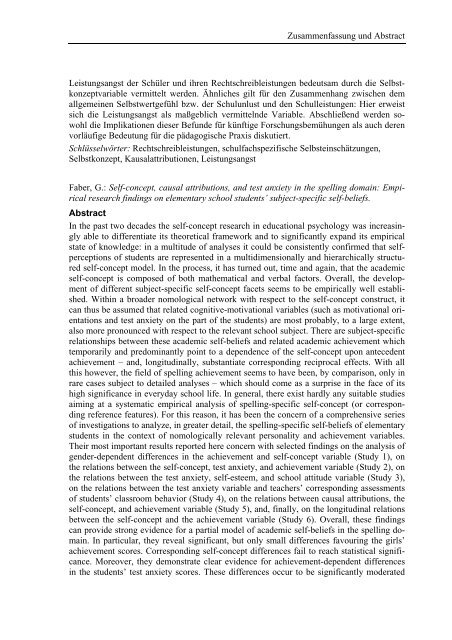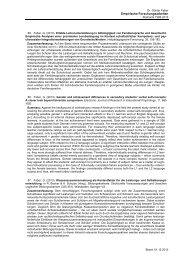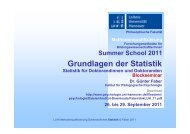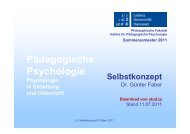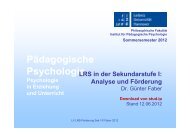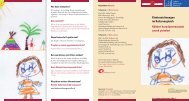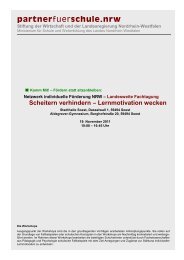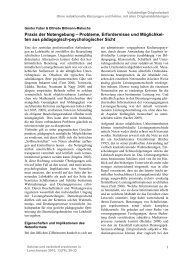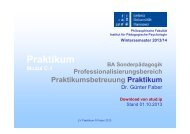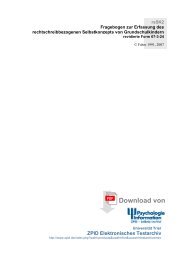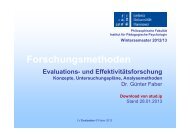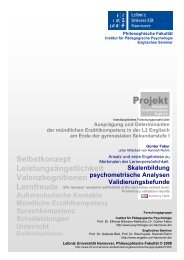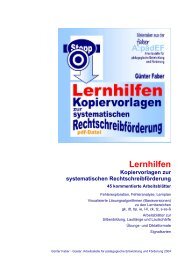Selbstkonzept, Kausalattributionen und Leistungsangst - Institut für ...
Selbstkonzept, Kausalattributionen und Leistungsangst - Institut für ...
Selbstkonzept, Kausalattributionen und Leistungsangst - Institut für ...
Erfolgreiche ePaper selbst erstellen
Machen Sie aus Ihren PDF Publikationen ein blätterbares Flipbook mit unserer einzigartigen Google optimierten e-Paper Software.
Zusammenfassung <strong>und</strong> Abstract<br />
<strong>Leistungsangst</strong> der Schüler <strong>und</strong> ihren Rechtschreibleistungen bedeutsam durch die <strong>Selbstkonzept</strong>variable<br />
vermittelt werden. Ähnliches gilt <strong>für</strong> den Zusammenhang zwischen dem<br />
allgemeinen Selbstwertgefühl bzw. der Schulunlust <strong>und</strong> den Schulleistungen: Hier erweist<br />
sich die <strong>Leistungsangst</strong> als maßgeblich vermittelnde Variable. Abschließend werden sowohl<br />
die Implikationen dieser Bef<strong>und</strong>e <strong>für</strong> künftige Forschungsbemühungen als auch deren<br />
vorläufige Bedeutung <strong>für</strong> die pädagogische Praxis diskutiert.<br />
Schlüsselwörter: Rechtschreibleistungen, schulfachspezifische Selbsteinschätzungen,<br />
<strong>Selbstkonzept</strong>, <strong>Kausalattributionen</strong>, <strong>Leistungsangst</strong><br />
Faber, G.: Self-concept, causal attributions, and test anxiety in the spelling domain: Empirical<br />
research findings on elementary school students’ subject-specific self-beliefs.<br />
Abstract<br />
In the past two decades the self-concept research in educational psychology was increasingly<br />
able to differentiate its theoretical framework and to significantly expand its empirical<br />
state of knowledge: in a multitude of analyses it could be consistently confirmed that selfperceptions<br />
of students are represented in a multidimensionally and hierarchically structured<br />
self-concept model. In the process, it has turned out, time and again, that the academic<br />
self-concept is composed of both mathematical and verbal factors. Overall, the development<br />
of different subject-specific self-concept facets seems to be empirically well established.<br />
Within a broader nomological network with respect to the self-concept construct, it<br />
can thus be assumed that related cognitive-motivational variables (such as motivational orientations<br />
and test anxiety on the part of the students) are most probably, to a large extent,<br />
also more pronounced with respect to the relevant school subject. There are subject-specific<br />
relationships between these academic self-beliefs and related academic achievement which<br />
temporarily and predominantly point to a dependence of the self-concept upon antecedent<br />
achievement – and, longitudinally, substantiate corresponding reciprocal effects. With all<br />
this however, the field of spelling achievement seems to have been, by comparison, only in<br />
rare cases subject to detailed analyses – which should come as a surprise in the face of its<br />
high significance in everyday school life. In general, there exist hardly any suitable studies<br />
aiming at a systematic empirical analysis of spelling-specific self-concept (or corresponding<br />
reference features). For this reason, it has been the concern of a comprehensive series<br />
of investigations to analyze, in greater detail, the spelling-specific self-beliefs of elementary<br />
students in the context of nomologically relevant personality and achievement variables.<br />
Their most important results reported here concern with selected findings on the analysis of<br />
gender-dependent differences in the achievement and self-concept variable (Study 1), on<br />
the relations between the self-concept, test anxiety, and achievement variable (Study 2), on<br />
the relations between the test anxiety, self-esteem, and school attitude variable (Study 3),<br />
on the relations between the test anxiety variable and teachers’ corresponding assessments<br />
of students’ classroom behavior (Study 4), on the relations between causal attributions, the<br />
self-concept, and achievement variable (Study 5), and, finally, on the longitudinal relations<br />
between the self-concept and the achievement variable (Study 6). Overall, these findings<br />
can provide strong evidence for a partial model of academic self-beliefs in the spelling domain.<br />
In particular, they reveal significant, but only small differences favouring the girls’<br />
achievement scores. Corresponding self-concept differences fail to reach statistical significance.<br />
Moreover, they demonstrate clear evidence for achievement-dependent differences<br />
in the students’ test anxiety scores. These differences occur to be significantly moderated


